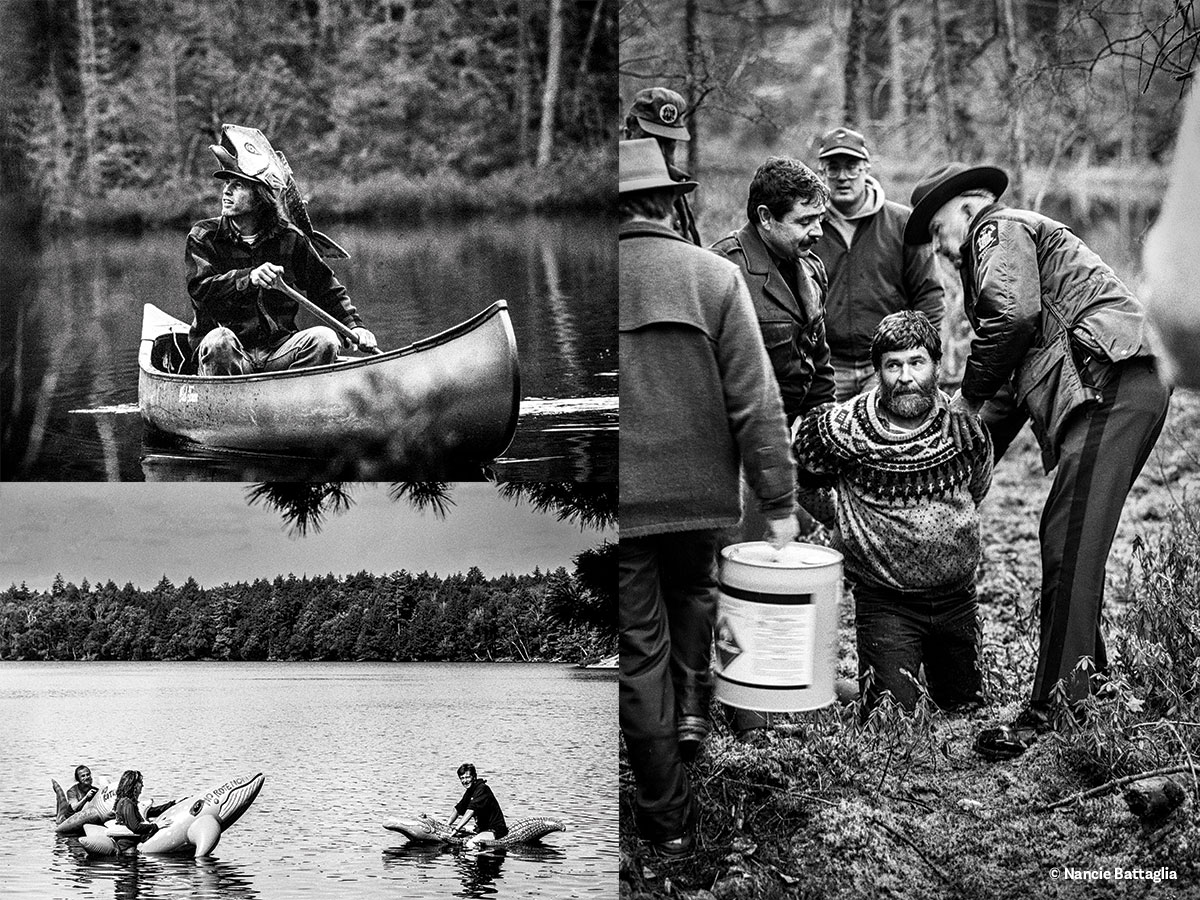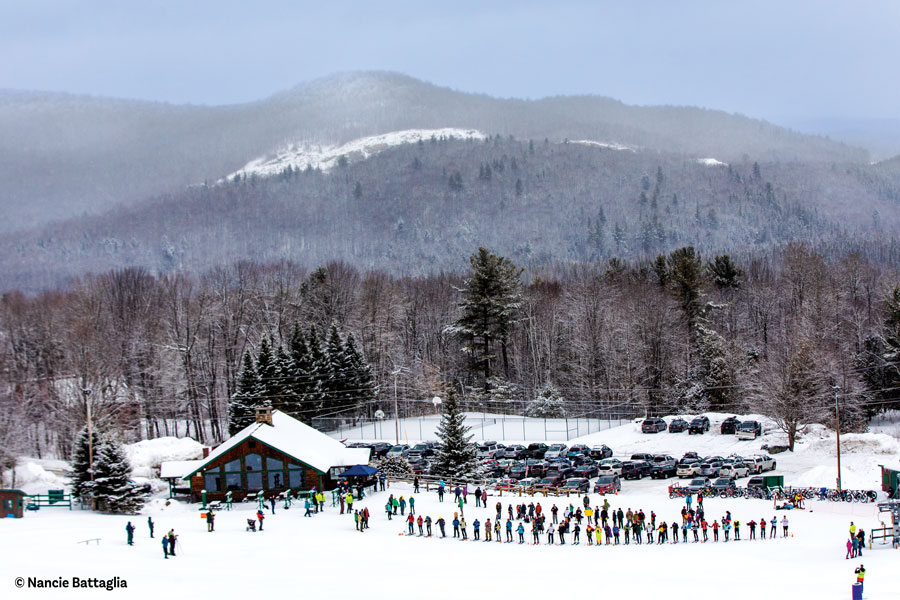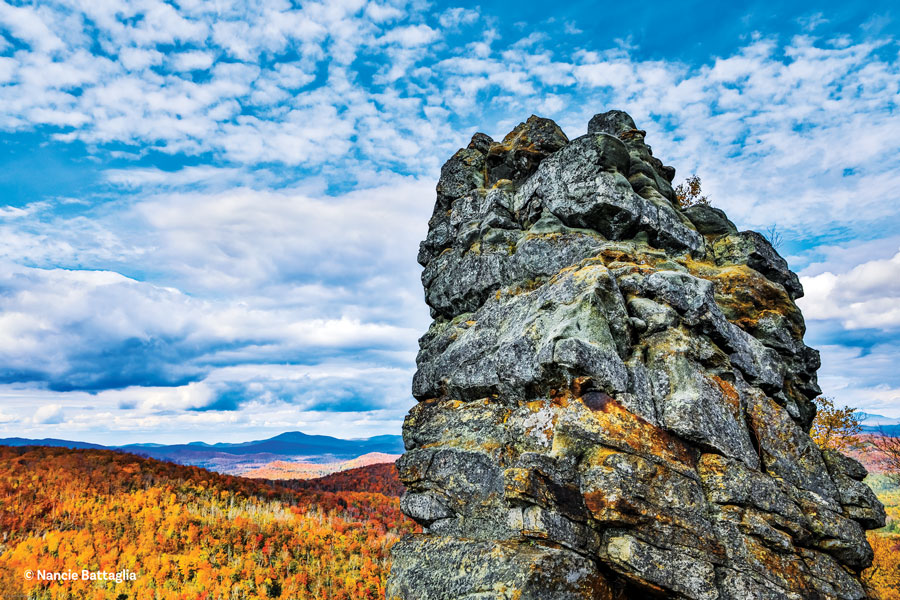Yet the virus hasn’t prevented the 17-year-old from showing up at 7:15 a.m. to sing for the Lake Placid Rotary Club, and to be honored with the club’s Kate Smith scholarship, a 1,000-dollar award given annually to Lake Placid High School’s most deserving music student.
Before the assembled Rotarians, Holmes belts and croons his way through a song from the musical Bring it On, a light-hearted ditty called “Enjoy the Trip.”
Holmes, like his audience, appears to do just that. And for a few minutes, the club members can forget that their award’s namesake, the late singer Kate Smith—pioneering radio superstar, Medal of Freedom winner, perennial Adirondack summer resident—has recently been on her own sort of trip. A bad one.
In March, Smith’s reputation was as healthy as the air in Lake Placid, where she retreated every year for nearly four decades to reinvigorate herself. By the end of April, her legacy had come down with pneumonia.
That’s when the New York Yankees ditched the playing of Smith’s signature song, “God Bless America,” during the seventh inning of home games. That’s also when the Philadelphia Flyers, for whom Smith served as a good-luck charm during the 1970s, summarily removed her statue from the front of their arena.
The sports teams “canceled” Smith, in the parlance of our times, because of the racist lyrics of two songs she recorded in the early 1930s, “Pickaninny Heaven” and “That’s Why Darkies Were Born.”
Both recordings had been sitting on YouTube for years, unnoticed, though “That’s Why Darkies Were Born” was so popular in its day that Groucho Marx used the title as a punchline in the movie Duck Soup.
To 21st-century ears, there’s nothing funny about either song. The language is offensive, and particularly in “Pickaninny Heaven,” the images are blatantly, condescendingly racist. Less remarked on, though just as troubling, was a 1939 print ad for Calumet baking powder that featured Smith in a comic strip that involved a “mammy doll.”
The broad modern public was unaware of any of this until the Yankees pulled the plug on Smith’s version of “God Bless America,” which the team had played regularly at home games since 9/11.
A social-media and talk-radio cultural skirmish erupted, with disavowals of racist lyrics, and, for many, disavowals of Smith herself as a racist, followed by counterattacks from those railing against runaway political correctness.
It put a lot of institutions in Lake Placid in a difficult spot.
The village named an avenue after Kate Smith. She’s in the Lake Placid Hall of Fame in the Olympic Center. A plaque commemorates her at St. Agnes Church, where she converted to Catholicism in the 1960s. The North Elba Historical Society features a Kate Smith gallery. The Crowne Plaza Hotel has a meeting room called the Kate Smith Library, where the Kate Smith Commemorative Society staged its annual meeting from 1998 to 2012. And there’s the Rotary scholarship.
Kathryn Elizabeth Smith, who died in 1986 at the age of 79, was truly beloved in the area and across the nation. As her fame and wealth exploded during the Depression thanks to her national radio show, which featured her homespun delivery and rich contralto voice, she purchased a camp on Lake Placid’s Buck Island in 1936. Two years later, she premiered Irving Berlin’s “God Bless America” on her show on Armistice Day, and it was more than just a hit—it became an unofficial national anthem, one that helped raise more than 600 million dollars for the troops in World War II. According to Sheryl Kaskowitz’s book, God Bless America: The Surprising History of an Iconic Song, Smith’s showstopper was adopted at various times by anti-fascists, labor organizers, civil-rights activists and archconservatives alike.
Smith had a second act in the 1970s as a campy good-luck charm for the Flyers hockey team, famously singing “God Bless America” ahead of the 1974 NHL playoff contest that gave Philly its first Stanley Cup. The team dedicated the statue in her honor in 1987.
Over the decades, Smith made herself a summer fixture in Lake Placid, befriending locals, eating breakfast at Howard Johnson’s after Sunday Mass, piloting her Chris-Craft speedboat on the lake, and even helping with the register at her friend Flora Donovan’s gift shop on Main Street. “She was just this unbelievably charismatic, happy, hearty woman,” says Cristina Lussi, sales and marketing manager at the Crowne Plaza, where Smith sometimes stayed before opening her camp in the summer. “My memories of her are amazing.”
The revelations about the 1930s songs didn’t exactly sully those memories, but they forced some soul-searching on everyone associated with Smith’s legacy, including the Rotary Club, which discussed removing the singer’s name from the award.
Kimberly Weems, who directs the choral and musical theater programs at Lake Placid High School, struggled with the issue as well. “My first reaction was, ‘Leave Kate alone,’” Weems says. “She’s dead and cannot defend herself. Then, I looked up the songs, and when I listened to the songs, I said, ‘Oh! Now I see.’ The songs are racist, to be sure, and certainly would be considered offensive and hurtful if performed today.”
But Weems is convinced Smith wouldn’t sing those songs now. “She would know better,” she says.
Weems consulted with the Rotary Club and with Cooper Holmes’s parents, Colleen and John. “The last thing in the world I would want is for our student to face any repercussions,” Weems says. “I had a talk with [Colleen] and John and we moved forward.”
It helped that Cooper’s grandfather, Tom McConnell, knew Smith personally. His firm insured Smith’s camp and much of her personal property. “I got to talk with her quite a bit,” he says. “She was a nice lady. We overuse the term down-to-earth, but she really was.”
That’s where many in Lake Placid have landed. Kate Smith was a nice person, generous to the community, and a patriot. Those songs came out in a different era. They’re standing by her.
In fact, the Town of North Elba and the Adirondack Sports Commission are trying to bring Philadelphia’s Kate Smith statue to the region. “We have sent messages to the Flyers,” says Sandy Caligiore, a chairman of the Lake Placid Hall of Fame committee, who is aware of the efforts. “If you don’t want to display it, send it here. We will.”
But the outrage over the songs came from nice people, too, who are tired of seeing purveyors of racism publicly honored. Donathan Brown, of Adirondack Diversity Solutions, a consulting firm, told the Adirondack Daily Enterprise: “Imagine reading dedications, seeing statues, and other tributes to a person who was openly bigoted. Now, imagine being a member of the targeted group (African-Americans) and seeing/hearing this for over 80 years, only until 2019 to actually see action taken to both revisit and, in some cases, remove such tributes.”
Racist imagery does lasting harm, says David Pilgrim, a sociologist and director of the Jim Crow Museum of Racist Memorabilia, at Ferris State University, in Michigan. “We were familiar with the song ‘Pickaninny Heaven,’” Pilgrim says, “because that’s one of our research areas, in terms of caricatures of African-American children.”
In presentations and exhibits, the museum shows such material to people and asks them to react. “The consensus with that clip is that it was horrible and that it definitely reflected and likely shaped some attitudes toward black children,” Pilgrim says. “For us it’s a teaching tool.”
One of the lessons: the stereotype of the unkempt, uncivilized “pickaninny” popularized through earlier mass media—including Smith’s song—has affected attitudes about black children for generations.
Kate Smith’s own history is complicated. She sang those songs, yes, but she fought fascism in the 1940s by raising money for war bonds and decried bigotry at home on her radio program. “That’s Why Darkies Were Born” was also sung by the African-American activist icon Paul Robeson, and can be heard not as an ode to racism, but as a sarcastic protest against it.
And Smith isn’t the only person on display in Lake Placid who has a problematic past. Norwegian Olympic figure-skater Sonja Henie’s images grace the 1932 Jack Shea Arena, just down the hall from Smith’s plaque in the Lake Placid Hall of Fame. But Henie was chummy with Adolf Hitler, even giving the Nazi salute to him at a competition. The Hall of Fame itself, meanwhile, appears to have no people of color among its more than 150 inductees.
On the heels of the Smith controversy, the American Library Association (ALA) removed the name of Melvil Dewey—inventor of the Dewey Decimal System and owner of the famed Lake Placid Club, which helped establish the village as a resort haven—from a prestigious award honoring librarians. In its decision to change the name of the Melvil Dewey Medal, the ALA cited Dewey’s exclusion of Jews and other minorities from the club, and several accusations of “sexual impropriety” and “inappropriate sexual advances toward women he worked with and wielded professional power over.”
Pilgrim believes communities should explore such issues and face the topic of racism head-on. “It fits into this larger discussion of what should we do when we discover an unpleasant part of the past of someone whom, heretofore, we’ve loved,” Pilgrim says. “When it comes to things like Confederate monuments or Kate Smith statues or whatever, I think they should be contextualized where they are. The process of doing that can be very meaningful for that local community. But it would mean some difficult discussions, maybe even some painful discussions. I think you eliminate the potential for some of those discussions if you just tear it down.”
Weems agrees. “We can take down Kate Smith’s statue, but mass incarceration still exists, poverty along the racial divide still exists,” she says. “The work for us is to do better.”
She notes that there are only 16 minority students at Lake Placid Middle/High School, and the Smith controversy sparked a discussion about making sure they are heard. “It’s not something that we even acknowledge—that these students’ experiences might be different than ours,” Weems says. “So, one of the things we want to start in the school is actually sitting down and talking to these students, and saying, ‘What is it like to be you moving around in this very, very predominately Caucasian school district and community?’”
If such conversations go forward, they won’t always be comfortable. But maybe Kate Smith’s legacy—her entire legacy—can teach the people of the Adirondacks something new and valuable. Perhaps, all these years later, that great big voice can help us all sing a different tune.

























